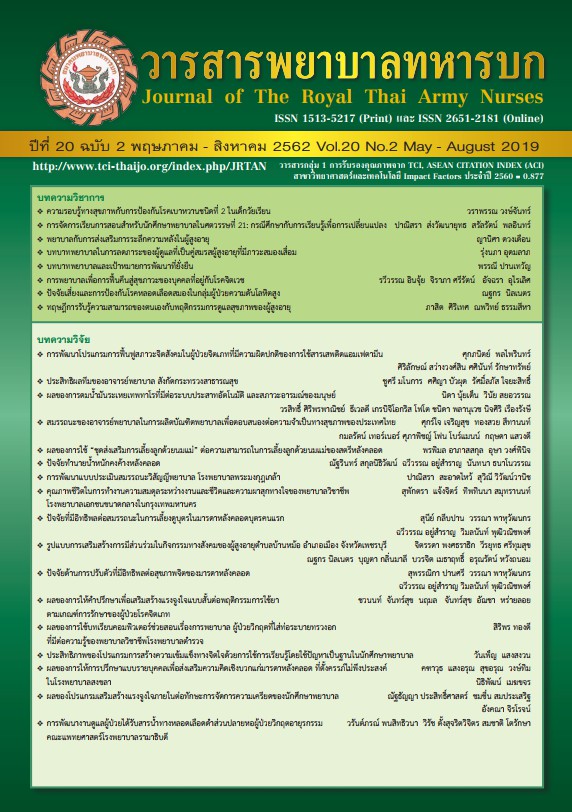Factors Predicting Anxiety and Depression Among Newly Diagnosed Breast Cancer Patients
Keywords:
Anxiety, Depression, Newly diagnosed breast cancer patientsAbstract
This descriptive research design aimed to study the factors predicting anxiety and depression among newly diagnosed breast cancer patients. The sample group consisted of 107 patients aged 18 years and older, who were undergoing chemotherapy at outpatient department and breast cancer surgery at Siriraj Hospital. The data were collected using the demographic data form, Connor-Davidson Resilience Scale, Self-Blame Attributions, The State-Trait Anxiety Inventory (STAI) Form Y-I and Form Y-II, Hospital Anxiety and Depression Scale. Descriptive statistics, Pearson’s Product Moment Correlation, and Stepwise Multiple Regression Analysis were used in data analysis.
The results of the study showed that the mean anxiety score was 2.82 (S.D. = 0.55) and the mean depression score was 0.98 (S.D. = 0.53). Resilience and trait anxiety could predict anxiety accounting for 72% of the variance (R2 = .720, p < .001). Self blame and trait anxiety could predict depression accounting for 59% of the variance (R2 = .590, p < .003).
The findings yielded by the present study should be developed into screening assessment and care guidelines for breast cancer patients in terms of mental state during the newly diagnosed stage.
Downloads
References
Siriraj Cancer Center, Faculty of Medicine Siriraj Hospital, Mahidol University. Siriraj Cancer Registry 2015. Bangkok: Siriraj Cancer Center; 2017. 1-64.
Koçan S, Gürsoy A. Body Image of Women with Breast Cancer After Mastectomy: A Qualitative Research. The Journal of Breast Health. 2016;12(4):145-50.
Bennett KK, Compas BE, Beckjord E, Glinder JG. Self-Blame and Distress Among Women with Newly Diagnosed Breast Cancer. Journal of Behavioral Medicine. 2005;28(4):313-23.
Khumtaveeporn P, Choocherd P, Sythipong S. Comparison Between Praying and Listening to the Pray on Stress and Quality of Sleep in Breast Cancer Patients. Journal of The Royal Thai Army Nurses. 2014;15(2), 386-394. (In Thai).
Nikbakhsh N, Moudi S, Abbasian S, Khafri S. Prevalence of depression and anxiety among cancer patients. Caspian Journal of Internal Medicine. 2014;5(3):167-70.
Zhong B-L, Li S-H, Lv S-Y, Tian S-L, Liu Z-D, Li X-B, et al. Suicidal ideation among Chinese cancer inpatients of general hospitals: prevalence and correlates. Oncotarget. 2017;8(15):25141-50.
Cardoso G, Graca J, Klut C, Trancas B, Papoila A. Depression and anxiety symptoms following cancer diagnosis: a cross-sectional study. Psychology, Health & Medicine. 2016;21(5):562-70.
Hiew CC, Mori T, Shimisu M, Tominaga M. Measurement of resilience development: Preliminary results with a state-trait resilience in inventory. Journal of Learning and Curriculum Development. 1998;1:111-7.
Markovitz SE, Schrooten W, Arntz A, Peters ML. Resilience as a predictor for emotional response to the diagnosis and surgery in breast cancer patients. Psychooncology. 2015;24(12):1639-45.
Janoff-Bulman R. Characterological versus behavioral self-blame: inquiries into depression and rape. J Pers Soc Psychol. 1979;37(10):1798-809.
Hill J, Holcombe C, Clark L, Boothby MR, Hincks A, Fisher J, et al. Predictors of onset of depression and anxiety in the year after diagnosis of breast cancer. Psychological medicine. 2011;41(7):1429-36.
Ando N, Iwamitsu Y, Kuranami M, Okazaki S, Nakatani Y, Yamamoto K, et al. Predictors of psychological distress after diagnosis in breast cancer patients and patients with benign breast problems. Psychosomatics. 2011;52(1):56-64.
Vries JD, Steeg AFVd, Roukema JA. Trait anxiety determines depressive symptoms and fatigue in women with an abnormality in the breast. British Journal of Health Psychology. 2009;14:143-57.
Faul F, Erdfelder E, Buchner A, Lang AG. Statistical power analyses using G*Power 3.1: tests for correlation and regression analyses. Behav Res Methods. 2009;41(4):1149-60.
Brodaty H, Pond D, Kemp NM, Luscombe G, Harding L, Berman K, et al. The GPCOG: a new screening test for dementia designed for general practice. J Am Geriatr Soc. 2002;50(3):530-4.
Griffiths J, Putthioi S, Pongsuksri M. The General Practitioner Assessmentof Cognition; GP-COG (Thai version): validity and reliability. In: 9th Pan-Pacific Conference on Rehabilitation cum 21st Annual Congress of Gerontology; 2014 November 29-30; Hong Kong. Kowloon: The Hong Kong Polytechnic University; [2014]. p.B65. (in Thai).
Connor KM, Davidson JR. Development of a new resilience scale: the Connor-Davidson Resilience Scale (CD-RISC). Depress Anxiety. 2003;18(2):76-82.
Malcarne VL, Compas BE, Epping-Jordan JE, Howell DC. Cognitive factors in adjustment to cancer: Attributions of self-blame and perceptions of control. Journal of Behavioral Medicine. 1995;18(5):401-17.
Spielberger CD, Gorsuch RL, Lushene R, Vagg PR, Jacobs GA. Manual for the State-Trait Anxiety Inventory. Palo Alto, California: Consulting Psychologists Press; 1983.
Zigmond AS, Snaith RP. The hospital anxiety and depression scale. Acta psychiatrica Scandinavica. 1983;67(6):361-70.
Nilchaikovit T., Lortrakul M., Phisansuthideth U. Development of Thai version of Hospital Anxiety and Depression Scale in cancer patients. Journal of the Psychiatric association of Thailand. 1996;41(1):18-30. (In Thai).
De Feudis R, Lanciano T, Rinaldi S. Coping Strategies of Southern Italian Women Predict Distress Following Breast Cancer Surgery. Europe's journal of psychology. 2015;11(2):280-94.
Markovitz SE, Schrooten W, Arntz A, Peters ML. Resilience as a predictor for emotional response to the diagnosis and surgery in breast cancer patients. Psychooncology. 2015;24(12):1639-45.
Schneider A, Kotronoulas G, Papadopoulou C, McCann L, Miller M, McBride J, et al. Trajectories and predictors of state and trait anxiety in patients receiving chemotherapy for breast and colorectal cancer: Results from a longitudinal study. European Journal of Oncology Nursing. 2016;24:1-7.
Hill J, Holcombe C, Clark L, Boothby MR, Hincks A, Fisher J, et al. Predictors of onset of depression and anxiety in the year after diagnosis of breast cancer. Psychological medicine. 2011;41(7):1429-36.
Downloads
Published
How to Cite
Issue
Section
License
บทความหรือข้อคิดเห็นใดใดที่ปรากฏในวารสารพยาบาลทหารบกเป็นวรรณกรรมของผู้เขียน ซึ่งบรรณาธิการหรือสมาคมพยาบาลทหารบก ไม่จำเป็นต้องเห็นด้วย
บทความที่ได้รับการตีพิมพ์เป็นลิขสิทธิ์ของวารสารพยาบาลทหารบก
The ideas and opinions expressed in the Journal of The Royal Thai Army Nurses are those of the authors and not necessarily those
of the editor or Royal Thai Army Nurses Association.






